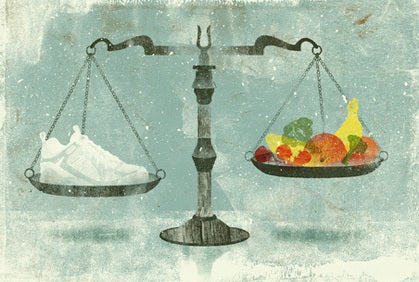Race Weight

I’m having a problem with refueling when I’m running a lot of miles. When training for my last race …
Photo by Kevin Howdeshell
I’m having a problem with refueling when I’m running a lot of miles. When training for my last race, I actually gained five pounds. In order to recover from my long runs I had to ingest extra calories. When I tried to restrict my eating, I didn’t have the fuel I needed. Any suggestions?
—D. MacCorquodale, Signal Mountain, TN
It appears that you are having trouble finding that break-even point of calorie consumption. Running a lot of miles requires a lot of energy, and thus a lot of calories. However our increased appetite can cause us to overeat. I find this is especially an issue for athletes who tend to eat very little while training (i.e. under 200 calories per hour). For some this overeating can cause weight gain, even when your training is at its highest volume.
Carrying any extraneous body weight will add seconds to each mile, so your goal should be to arrive on race day at your ideal race weight. Matt Fitzgerald, author of Racing Weight, suggests two methods that can help in this effort: nutrient timing and maintaining a high-carbohydrate diet.
“Nutrient timing is trying to get the majority of your daily calories when you need them most—first thing in the morning and before, during and immediately after workouts,” says Fitzgerald. This will create an environment where calories are being used to fuel the workout and, immediately afterward, to replenish stored energy in the form of glycogen, and therefore not stored as fat.
Although good fats and clean protein are a necessary component to good nutrition, with the increase in miles comes the increase in carbohydrate demands. Says Fitzgerald, “Carbohydrate intake is the primary dietary determinant of training and recovery quality.” You should aim for three-plus grams of carbs per pound of body weight when training loads are heavy. Adds Fitzgerald, “Unless you’re getting 60 to 70 percent of your daily calories from carbs, it’s difficult to get enough carbohydrates to support heavy training without overeating.”